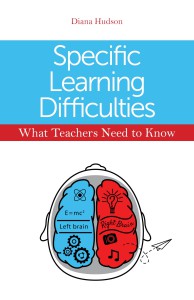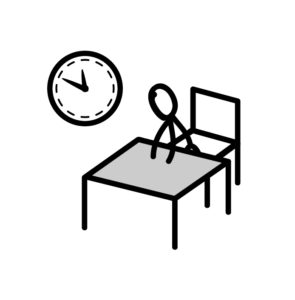 Specific learning Difficulties (SpLDs) include conditions such as dyslexia, dyspraxia, dyscalculia, attention deficit disorder (ADHD) or autism spectrum disorder (ASD). Exam time is stressful for all students but those who have Specific Learning Difficulties may find it a time of great anxiety and despondency. Often these students have a history of underachieving in test situations and so they feel worried, depressed and lacking in self-confidence. They may fret about remembering material accurately, misreading questions, failing to understand instructions and mistiming answers. Even getting to an unfamiliar exam room can be a source of worry.
Specific learning Difficulties (SpLDs) include conditions such as dyslexia, dyspraxia, dyscalculia, attention deficit disorder (ADHD) or autism spectrum disorder (ASD). Exam time is stressful for all students but those who have Specific Learning Difficulties may find it a time of great anxiety and despondency. Often these students have a history of underachieving in test situations and so they feel worried, depressed and lacking in self-confidence. They may fret about remembering material accurately, misreading questions, failing to understand instructions and mistiming answers. Even getting to an unfamiliar exam room can be a source of worry.
So what can teachers and parents do to support them?
Adults can make a big difference in keeping the student’s morale high and can help them to plan and pace their work with time for relaxation.
1. The run up time; encourage students to plan ahead and keep a calm, balanced approach
• Have at least one copy of the exam timetable visible in a prominent place
• Help the students to make a realistic Revision timetable and factor in any other important events, such as birthdays or planned outings, to the revision timetable
• Include a few things to look forward to – a football game, concert, trip with friends
• Do they know where the exams are being held? Student who get lost easily may feel happier if they visit the room first, especially if it is a different room to the main hall used by most students
Make Revision varied and keep it interesting
• Encourage the use of multisensory techniques to revise
• Help the student to find their own best learning channel : auditory, visual, kinaesthetic
• For most people a combination of methods works best. It relieves boredom and keeps the brain actively engaged
Learning style Revision methods
| Learning style | Revision methods |
| Visual | Left brained: Write out bullet point notes; highlight key words; mnemonics; make posters of phrases, key words or formulae
Right brained: Mind maps; cartoons; drawings; flow charts; time lines; use coloured pen or coloured card; make posters illustrating facts or associated ideas; use computer programmes |
| Auditory | Listen to tapes of set books; read information aloud; self-record and play back, revise with a friend asking and answering questions; convert facts into song, raps, rhythms, poems |
| Kinaesthetic | Use practical examples; let everyday items represent the topic material in order to understand concepts- e.g. a battle scene could be played out with different coloured paper clips; make 3D diagrams; walk about and recite; lie on the floor; stand on one leg to say French verbs; handle equipment; use inter-active computer programmes |
Encourage student to:
• Revise in short bursts
• Vary the approach and subject frequently
• Set up a fixed place to work that is free from distractions where books and materials can be left undisturbed
• Switch mobile phones off
• Use each subject’s syllabus to guide revision
• Summarise key points in a handy way for quick referral
• Find innovative ways to keep the work fun
• Do practice questions ideally with mark schemes to check answers
• Learn to identify and interpret key instruction words such as describe, explain, compare, contrast, evaluate, criticise, summarise
Factor in relaxation and rewards
• Keep reward times such as doing a hobby or watching a favourite programme in the schedule
• Teach relaxation techniques
• Sport: this is good for health and wellbeing; exercise releases endorphins and improves blood flow to the brain
• Ensure they have a good balanced diet
• Adequate sleep is very important
2. Special exam provision
Students who have been assessed as having an SpLD may be eligible for special exam arrangements. The school SENCO (Special Educational Needs Coordinator) will organise these arrangements which could include:
• Extra time
• Use of ICT
• Coloured paper
• Enlarged script
• Readers
• Separate room
3. The night before – encourage students to:
• Have an early night
• Avoid long phone / social media conversations with peers
• Look at key points / summaries only – not the whole syllabus
• Exercise
• Organise equipment, pencils, pens, calculator etc. in the correct transparent bag
• A bottle of water or a small snack may be allowed
• Check transport arrangements for the morning
• Have a nice meal not too late
• Double check timing of public exams
• No electronic gadgets in bedroom
4. On exam day students should:
• Get up in good time
• Eat breakfast
• Pick up their equipment
• Get to venue a little early to give time to relax
5. Useful techniques for during the exam:
• Relaxation techniques at the beginning – wiggle shoulders and ankles, breathe deeply
• Make sure they can see (and read) a clock; some students find digital clocks easier to work with so they may need their own on the desk
• Read exam instructions carefully, twice! How many questions should be answered? Should questions be taken from different sections? This is a common source of error
• Plan the timing of long essay answers
• Read key instruction words in questions carefully, use highlighters or underline to emphasise them
• Plan the content of long answers, frequently making sure they relate to the title
• Check answers at the end
6. Afterwards – suggest that students:
• Avoid post exam mortems with friends
• Don’t dwell on mistakes. People tend to remember the things they did wrong not the bulk of things that went well
• Do something different for a while to de-stress; fresh airs, exercise, listen to music
• Enjoy crossing it out on the timetable
• Gear up for the next one remembering that they don’t last forever!
Diana Hudson is the author of Specific Learning Difficulties- What Teachers Need to Know